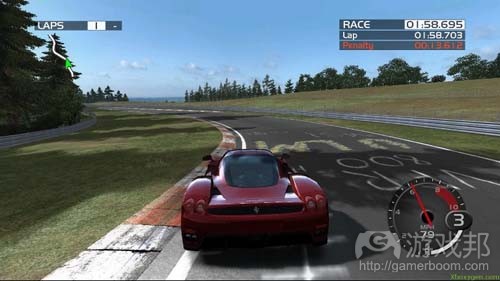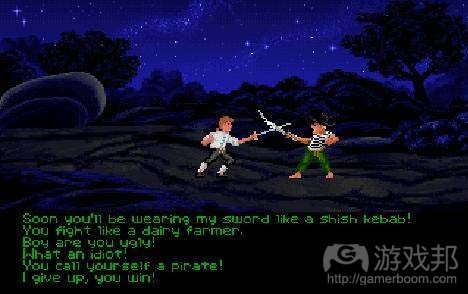设计师该如何为玩家设置游戏中的选择?
作者:Randy OConnor
据称真正的游戏是为玩家而非设计师提供情感控制权。但是我却不认可这一观点。事实上,给予玩家多少选择,选择将会带来何种影响以及玩家会如何做出选择等才是我们(作为设计师)对于玩家的真正控制。我们以何种方式呈现出何种选择都将决定着玩家的情感回应。
互动
首先来说说玩家系统的互动。就像赛车游戏主要是关于玩家与界面间的互动。在这里选择是关于精通系统去获得预想的结果。选择并非取决于玩家决定该做什么,而是该怎么做,这种设计的情感力量主要源于玩家对系统的精通,了解什么才是最佳选择,并能够做出最有效的选择。
设计师必须选择如何去挑战这种系统精通,《使命召唤》便利用了这种情感设计原则。精通系统并了解如何通过有效互动而创造出特定玩家回应将能让玩家在面对这些选择时感到自豪和愉悦,并在未能掌握技巧时感到愤怒。除此之外设计师是否还能创造出更多情感回应呢?
像《星际争霸》等游戏便突出了这种系统精通,在游戏中所有优秀的玩家都将掌握热键的使用,清楚自己首先需要建造何种内容,以及获得更多选择需要何种技巧等等,《星际争霸》还通过获胜条件去限制了玩家能够获得的选择。
选择的广度
这是关于我们所做出的选择在整个游戏系统中具有何种意义。游戏中包含了叙述系统和目标互动系统,这是两种功能性游戏元素,而如果设计师能够做出合理的选择,这两大系统便会具有非常重要的功效。叙述系统是关于环境和外观,而目标互动系统则是关于游戏内部的功能。这主要是关于我们为玩家提供了多少选择以及这些选择各属于何种类型。
目标关卡互动选择主要是关于玩家如何改变他们的游戏世界。Lucasarts的冒险游戏便是关于挖掘游戏中双关语的深层次含义,寻找各种不同的目标以及它们的用途等。审查,打开和谈论就相当于一款射击游戏中的射击,恢复生命值和扫射。不管是Schafer(游戏邦注:现任Double Fine Productions创始人,制作了许多大受欢迎的游戏,如《猴岛冒险》等)还是Gilbert(著名冒险游戏创作人)都致力于创造目标互动关卡(目标便是创造情感和笑声)。就像在《猴岛冒险》中阅读一行对话不仅能让玩家感受到幽默,同时还能从中获得进一步前进的选择,并让他们能够深入挖掘对话在系统中的内在含义,而是否让玩家阅读对话则体现了冒险游戏故事写手所掌握的特权。
其中也包含着设计师所具有的权利。在冒险游戏中,玩家将多长时间才能获得一个选择去推动角色前进?在系统中某一功能是否具有意义?不让玩家做任何事情,只让他们行走并谈话,并使用一些琐碎内容推动故事前展的选择,已因其运用广泛而成为冒险游戏中的一种特定选择。
围绕着这些稳定且清晰的系统,类型将不断发展着。面对某些玩家我比较了《火星漫步》与《银河战士》的游戏世界结构,对于他们来说这便是他们理解中的游戏世界,但是从某些方面看来这却是一种不合理的比较。
如今的射击游戏都拥有掩体系统,因为这是所有人都认可的系统。我曾多次提及希望看到更多不同肢体互动系统的出现。是否曾有人开发出一些会让你费力装载弹药,操作武器的过程如同射击一样复杂和费劲的游戏?《孤岛惊魂2》有一个让玩家自制枪支的机制,虽然这种设置有点意思,但它真的让游戏更有深度了吗?如果游戏让玩家必须不断地重置子弹,便会带给他们完全不同的情感反应。
《模拟城市》又是怎样的情况——包括城市的创造与毁灭,玩家选择的广度等等。游戏中所具有的创造,毁灭与维护,以及玩家所做出的选择都与推动线性故事发展的目标毫无关系,而是Wright根据玩家想要看到的以及玩家可能采取的行动所做出的选择。
环境选择是游戏情感设计的前沿
环境选择是我们在游戏中所做出的有意义或无意义的选择。游戏中既存在着积极/具有创造性的选择,也不乏消极/具有破坏性的选择。当我们想要选择时游戏中可能就缺少选择,而当我们被限制在一个狭窄的环境中时游戏又会为我们呈现过多的选择。《模拟城市》的某些场景为玩家呈现出了环境选择,但是更多情况下玩家都是在此建造属于自己的城市。
Anna Anthropy所制作的《Dys4ia》便是一款很棒的游戏,我之所以喜欢这款游戏是因为设计师在故事环境下限制了玩家所面对的选择。玩家可以基于任何顺序去体验不同的环境,但是就像生活一样,当玩家真正适应了这种环境时,他们便会产生各种好奇。我们甚至会在自己拥有任何权利和控制力量时感到惊讶。就像吃药的“选择”便具有冲突,我也想知道我们真正能够拥有多少选择?
我不喜欢《侠盗猎车手IV》便是因为游戏环境明确表示我并未拥有任何选择,但是游戏却呈现出一个开放的系统。当我将驾车驰骋并无视Lil Jacob的呼叫时我便只会遭遇惩罚。让我感觉自己好像因为接触了游戏所怂恿的各种系统而遭遇了惩罚。游戏中穿插了各种各样的故事,设计师并不希望玩家自由穿梭于城市中。但是这些故事却不够多元化,难以为玩家有效地呈现出一座美丽,广阔且健全的“自由之城”。我便是因为这款游戏的环境选择而倍感沮丧,并最终离开了游戏。在玩了10个小时的游戏后我便因为游戏体现出了过多现实的责任感和压力而放弃了游戏。
与之相反的是我会反复回到《我的世界》中,因为不管怎么看它始终都是一款出色的游戏。游戏中的每一个选择都具有自己的意义。它还拥有内在的环境设置,每一个行动的环境都将成为玩家开放性叙述的一部分。也许你的世界不会对其他玩家造成过多影响,但是你却能够始终面对着自己的故事而发展。选择环境已经深深嵌在玩家的游戏体验中,并且玩家选择所获得的奖励也将体现在各自的环境中。不管玩家做出何种行动都是有回报的。牺牲能够获得奖励,犯错能够获得奖励,就连漫步在偏僻的路径上玩家也能够看到更多不同的环境。
所以结果是怎样的?
我们几乎在任何一款游戏中都设置了相同的选择:奔跑,爬行,跳跃,射击,建造,收集道具等,而这也只是其中的一部分。《我的世界》对于我的控制主要是同时提供给我消极和积极的选择,就如建造是收集道具的一部分,Markus Persson中所呈现的情感控制总是非常有限,但是他却总能重新构思每个选择的意义。
只有当我们意识到我们所提供的选择具有情感空间,我们才能够真正打破更多情感束缚。
(本文为游戏邦/gamerboom.com编译,拒绝任何不保留版权的转载,如需转载请联系:游戏邦)
The Power of Choices
by Randy OConnor
It’s been suggested that true games give the player rather than the designer power over emotion. But I don’t believe that’s true. It’s how much choice we give players, what that choice affects, and how the choice is resolved that gives us as designers power over a player. We present choices, and the manner in which we do so determines how they will emotionally respond.
The Interaction
First there is the player-system interaction. For example, a racing game is heavily about player-interface-interaction. The choices are about mastering the system to a desired outcome. The choice lies not in deciding what to do, but how to do it, and the emotional power of this design is in the mastery of a system, knowing what is the right choice and being able to choose correctly.
The designer chooses how to challenge this mastery, but Call of Duty employs the same emotional design principals as racing. Mastery of the system, knowing and learning how to correctly interact creates a certain player response, it allows players to feel pride, exhilaration in those moments of choice, or anger at oneself for failing to master technique. Can it possibly create more emotional response than that?
This mastery of systems includes other games like Starcraft, wherein any great player learns hotkeys, learns what to build first, necessary techniques that open up more choices further in the game, choices that in Starcraft are still limited by the necessity of victory.
The Breadth of Choice
This is how the choices we make mean within the overall systems of the game. There are narrative systems and object interaction systems, these are the two functional game elements, and both of these systems are important if the designer so chooses. The narrative is the context and aesthetic, the object-system-interaction is the functioning of the pieces within a game. This is how much choice we give a player over the systems that run a game and what the style of that choice is.
Object-level-interaction is the choice of the player on how they alter their world. A Lucasarts adventure game is usually about discovering the depths of the wordplay, the disparate objects and their uses. The inspect, open, and talk are equivalent to the shoot, pick up health, and strafe of a shooter. Schafer or Gilbert or another is working at an object interaction level where the objects are about creating emotion and laughter. Reading a line of dialog in Monkey Island lets you see the humor of the line and gives you the choice to even go further and see what that line means within the system, but reading the line alone is the power of an adventure game writer.
And therein lies the power of the designer. In an adventure game, how often are you given the choice to punch a character? Is that a function that makes sense within the system? The choice to not let you do anything but walk and talk and use miscellany to progress the story is a specific adventure game choice that seems almost necessary because it’s so common.
Genres grow up around these concepts of presumably stable and clear systems. I have compared Waking Mars to Metroid in world structure to some people, because that’s what they understand, but it’s a grossly inappropriate comparison in every other regard.
Shooters all have cover systems now, because that’s just what you do, it’s a system that has been agreed upon. I have mentioned multiple times that I’d like to see more done with wider physical interaction systems. Have people made games where you fumble with your ammo clip, where handling your equipment is as complicated and taxing as shooting? Far Cry 2 has your guns jam, to make the guns themselves mean a little more, but did it go much deeper? If you made me fumble with reloading, you would create different emotional cues that might go in new directions. We have reached the end of the line on shoot or don’t shoot, we know the extent of that emotional power.
How about Sim City, the creation and destruction of cities, the breadth of our choice. It’s creativity and destructivity, and upkeep, choices we make not with a goal of forward movement through a linear story, rather choices Wright made that asked what you wanted, and what will you do to keep your dreams afloat. Is it possible even to do so?
And the Context of Choices is the great frontier of game designing emotion.
The context of choice is this idea that what we do within a game means or doesn’t mean something. There are positive/creative choices, there are negative/destructive choices. There is the lack of choice when we want choice, there is too much choice when we’re tied down to a narrow context. Sim City has some scenarios to give context, but often it’s about creating our own.
Dys4ia by Anna Anthropy is great, and I love it exactly because it seems to me that the designer has chosen to limit your choice within the context of the story. You have these chapters you can play in any order, sure, but life itself when you get to the living of it, we can’t help what happens. Whenever we’re given any power and control at all along the path it is almost surprising. The “choice” of taking your pills is jarring, and how much choice, I wonder, do we really have?
GTA IV bothered me because the context said that I had no choice, and yet the system was wide open. I would be joyriding and ignore a call from Lil Jacob only to see a little thumbs-down appear for ignoring him. I felt like I was punished for embracing the over-arching systems the game encouraged. There was so much story to go through, they didn’t want me free-roaming the city. Their story wasn’t dynamic enough to uphold the beautiful and expansive and physical Liberty City. The context of my choices pushed me away from that game, disheartening me. I dropped the game because after 10 hours they had too successfully captured the responsibilities and pressures of real-life, and I didn’t care anymore as I had with GTA 3.
And I always return to Minecraft, because it’s always so beautiful as the example. Every choice means something. It has internal context. The context of every action builds into an open narrative that is yours. Your world may not mean much to someone else, but that chip in a stone wall you made digging some coal to create a torch has a story. The context of a choice is internal to you, yet the game rewards play by making every choice reflected in your environment. Everything is earned. Sacrifices are rewarded, mistakes are rewarded, wandering off the beaten path shows you all the more environment that you might get the urge to affect.
So What?
We give the same set of choices in almost every game we make: run, crawl, jump, shoot, build structure, collect item, but that’s only a part of it. Minecraft’s power over me is that the choices are often both negative and positive, build structure is part of collect item, and the emotional control that Markus Persson exercised over his game was limited, but he reimagined what those choices mean.
We can break so many more emotional boundaries if we recognize that the choices we give create emotional spaces. It’s not enough to shoot or not shoot. Have we ever actually let the player put down their gun and start TALKING to the enemy? Will we ever give Gordon Freeman not only a crowbar but a voice?(source:GAMASUTRA)










































 闽公网安备35020302001549号
闽公网安备35020302001549号